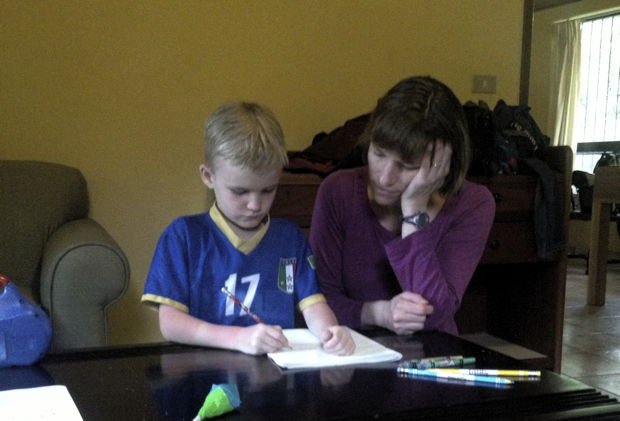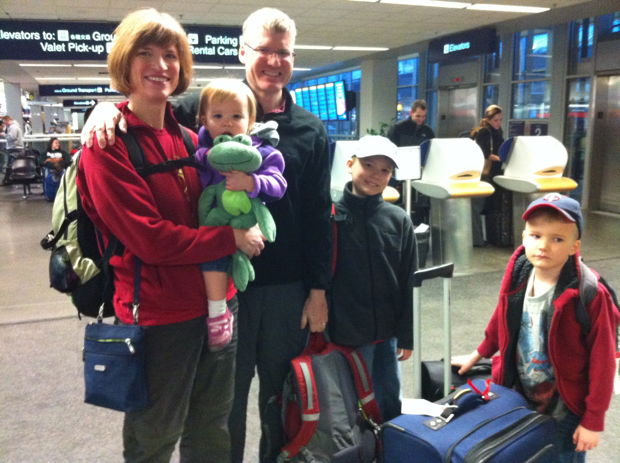
The last batch of cookies are in the oven and it’s almost 11:00 p.m. This is my time to get things done, when the kids (and my husband) are all sleeping, so maybe I’ll try to write a bit before doing devotions and going to bed.
I just finished checking email, pouring over one about recent break-ins in our neighborhood, listening avidly to a video our church put out, and making plans to talk to the director of the international ministry organization of which I am on the board.
My husband put the kids to bed tonight so I could have a “phone date” with my college roommate and good friend. She has four kids (and one more on the way), I have three, and we both practice medicine part-time. There aren’t many minutes in the day where someone or something is not asking for our attention. Being type A organizers, we schedule phone dates — we try for every month, but when schedules get busy, we may go a couple months between talks — and then spend one to three hours systematically marching through the areas of our lives to compile a full update.
Earlier this evening, I listened to my son practice the piano, amazed at how his fingers have seemingly morphed into a picture of flowing beauty when only a week ago the notes were jagged and abrupt.
Dinner tonight consisted of leftovers warmed up after my son and I returned home from his first swim team practice.

My son said it was “like torture” doing three repetitions of 200-freestyle, but he also seemed proud of himself. Even though he had protested the suggestion of joining the swim team, I noticed that he was humming when we walked into the YMCA. This is what he does when he is happy and excited about something. I smiled to myself and didn’t mention it to him.
The afternoon was spent catching up on work emails, reading a journal article, and checking on a patient’s chart. These are the things that I have to make lists for; if I don’t, they slip through the cracks of my desk and my brain and never get done. I have always been a list-maker, but recently I heard that a small amount of endorphin is released whenever you check something off of a list and this has fueled my eagerness for list-making and more importantly, for list-crossing-off.
I was scheduled in clinic this morning. I had a full schedule but only about half of the patients came in, possibly because it was -11 F. The meager schedule gave me a chance to spend more time talking with the undergraduate student who was shadowing me, trying to make a decision about his career. It also allowed me to address five issues for one of my patients. She, too, made a list today; it had six or seven things on it, and then she mentioned a few extras as we were talking. The list included things that were inconveniences, like her hair not growing, and things that were incomprehensible to me, like her life-shattering history of sexual abuse. The “20 minute” visit took over an hour. She thanked me for the time I had spent with her. I think she felt relieved to share some of her life with another person and also to cross a few things off her list.
Before leaving the house at 7:15, I got up at 5:45 a.m., got myself ready, and made lunches for myself and the kids. And then we stood, as we try to every morning, the five of us holding hands in a little circle, to say our morning prayer: “Dear God, thank you for this day. Help us to love and serve You. AMEN!” My 20-month old daughter knows that when we say AMEN, she gets to swing back and forth, suspended by the hands of her mom and dad. AMEN! “More . . . more . . . ,” she calls out. AMEN!!

After reading about Tricia’s day, we had some questions for her:
Do you get to catch up on sleep anytime? Is six hours or so typical for you?
Being a late night person with early morning obligations (like getting the kids off to school and trying to get regular exercise), I find it difficult to get enough sleep. It’s always a struggle. And as I get older, I’m not able to burn the candle on both ends as much, so I sometimes just have to go to bed and “let things go.”
How much time does a board position take? Knowing that can vary widely, how much time does this board take for you?
Lutheran Partners in Global Ministry’s board meets quarterly for two hours and then there are committee meetings and emails in between that total about 2-4 hours each month.
Any generalities in terms of how dinner gets on the table?
My husband, Chris, works full time and has a lot of weekend responsibilities, but his typical weekday is, thankfully, quite predictable. He leaves at about 8 and comes home about 5. My days, on the other hand, are much longer (usually about 10-12 hours), but I only work two days a week. So, we have agreed that he makes dinner on the days I work and I make dinner the other days, and we have accepted the fact that I often get home late on my work days (6 or 7 p.m. or later), but then we are grateful that I’m home the other days of the week.
How do you decide how much to have your kids do outside school/church?
That is a great and hotly debated question amongst my friends and peers. It’s hard to decide how many things to “sign the kids up for.” I have friends who do much more and friends who do less. We have decided to try to do one physical activity at a time in addition to church choir and piano lessons.
I recently spent a few days of angst going back and forth on one of these activity choices before I finally made a decision. I was considering trying to do both swimming and karate on Thursdays, which would entail taking all three kids to the YMCA, getting Andrew into swimming, rushing Peter to karate, and then going back to pick Andrew up from swimming a number of miles away, all the time toting little 20-month-old Sophia. I was trying to appease both kids' most enjoyed activities. But I decided that it was crazy and would only make me dread Thursdays.
I made the decision after sitting next to a wonderful couple with grown kids at a board dinner. They talked about how they feel like everyone is over-scheduled and the mother said, "I simply decided that if I felt crazy, it was too much." I thought that was very wise. It is a gift to have older parents to talk to about life, parenting, and decision-making.
Tell us what helps to make your life work and what areas are you working on.
What works for us:
- My parents live less than a mile from us, they are retired, and they are exceedingly gracious in their love for and care for our children both on a regular basis and “in a pinch.” I know this isn’t a situation all families have, but it has been an immense blessing for us.
- Working part-time has been ideal for me while our children are young. My husband and I both cherish the time I am able to devote to our children, and yet I am also able to maintain my career. Sometimes I feel like I’m not pulling my weight as much as other faculty members, but I am grateful that they have expressed appreciation for what I do and the role I play in the group as a whole.
What we’re working on:
- We attempt to set aside time for our marriage, but honestly, it’s hard. We try to sit together at the end of our days to talk and pray, but we’re often both really tired. We also schedule “date nights,” but other events and demands sometimes take precedence.
- I am working on how to decide how many things to “take on.” I read the church bulletin and think, “oh yeah, that sounds great . . . let’s do that . . . I’d like to read that book . . . let’s take the kids to that service project,” and then I get home and feel overwhelmed. It’s never a perfect balance, but I’m trying to be ok with volunteering for some things and saying “no” to others. There are so many worthy passions and opportunities, and it can be hard to resist the temptation to do everything, but I think that thoughtfully allocating our time is part of God’s calling for us.